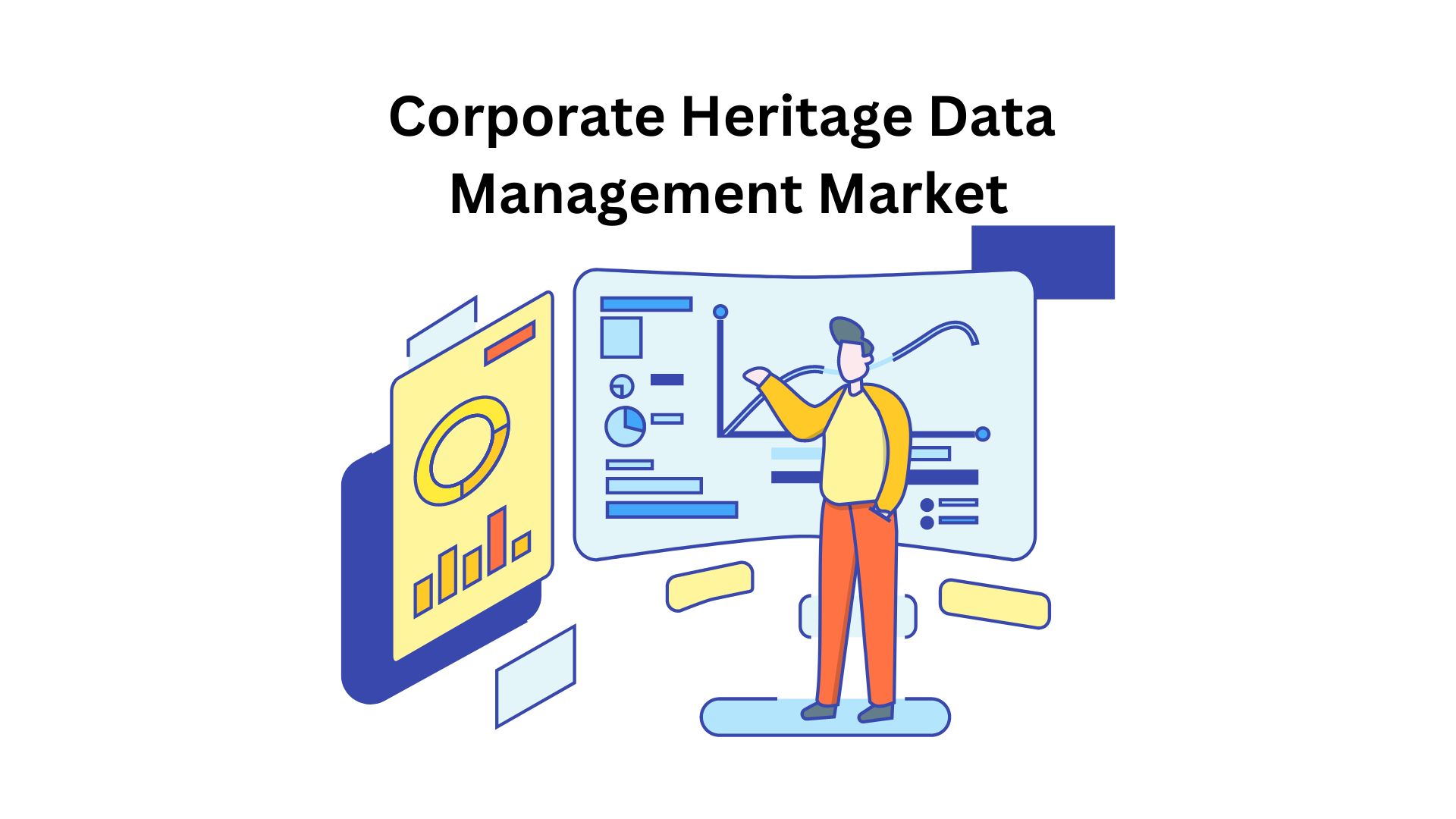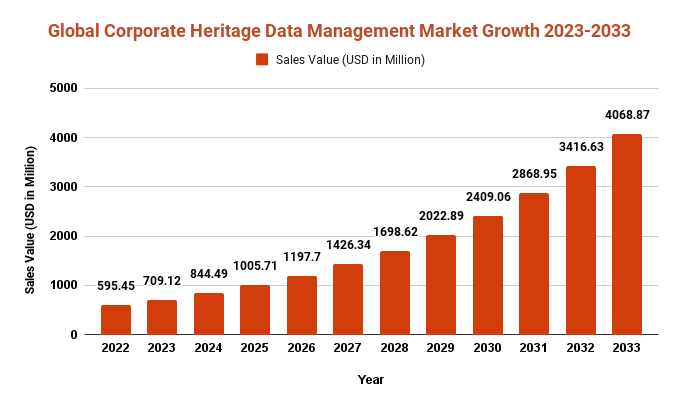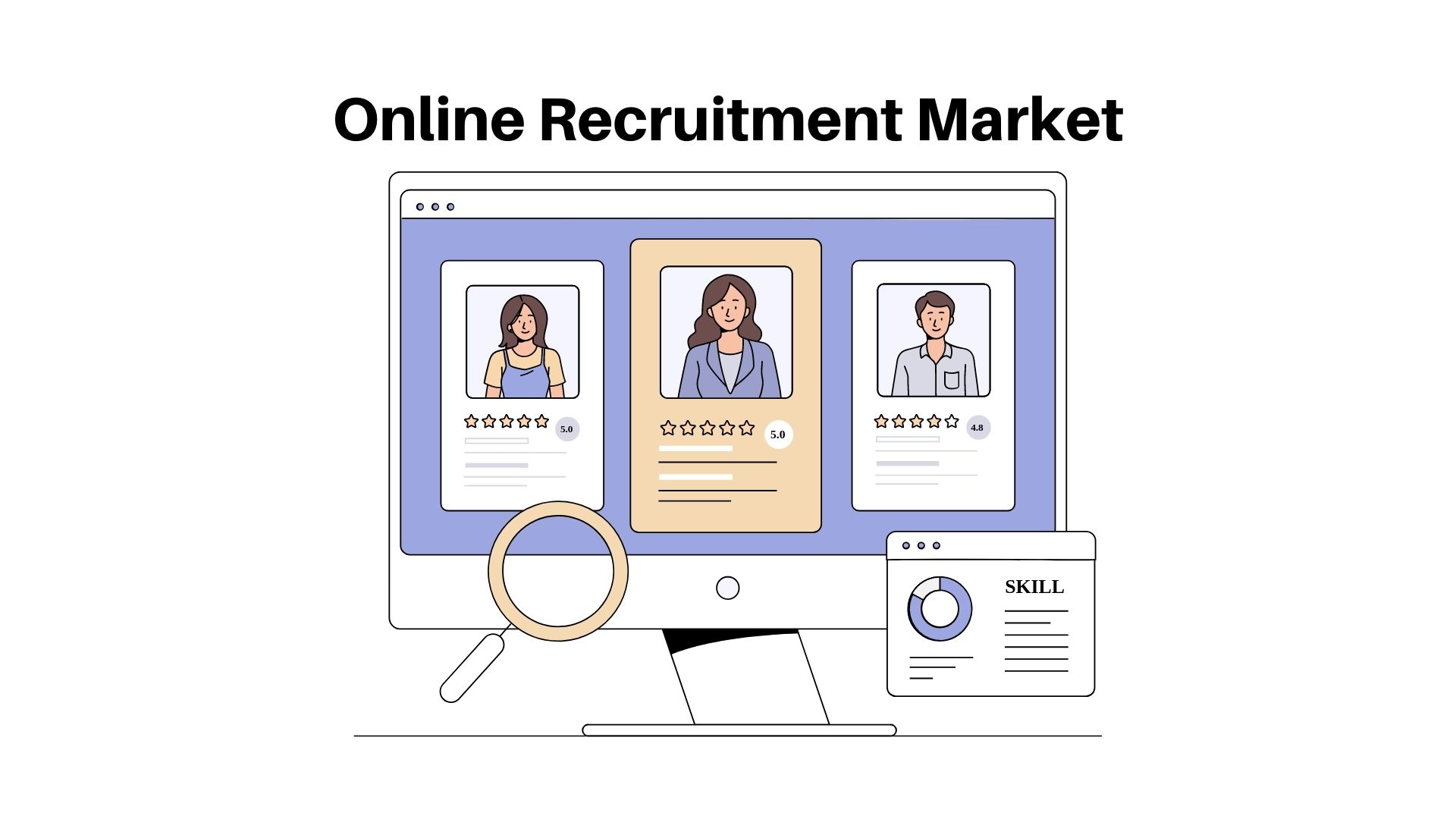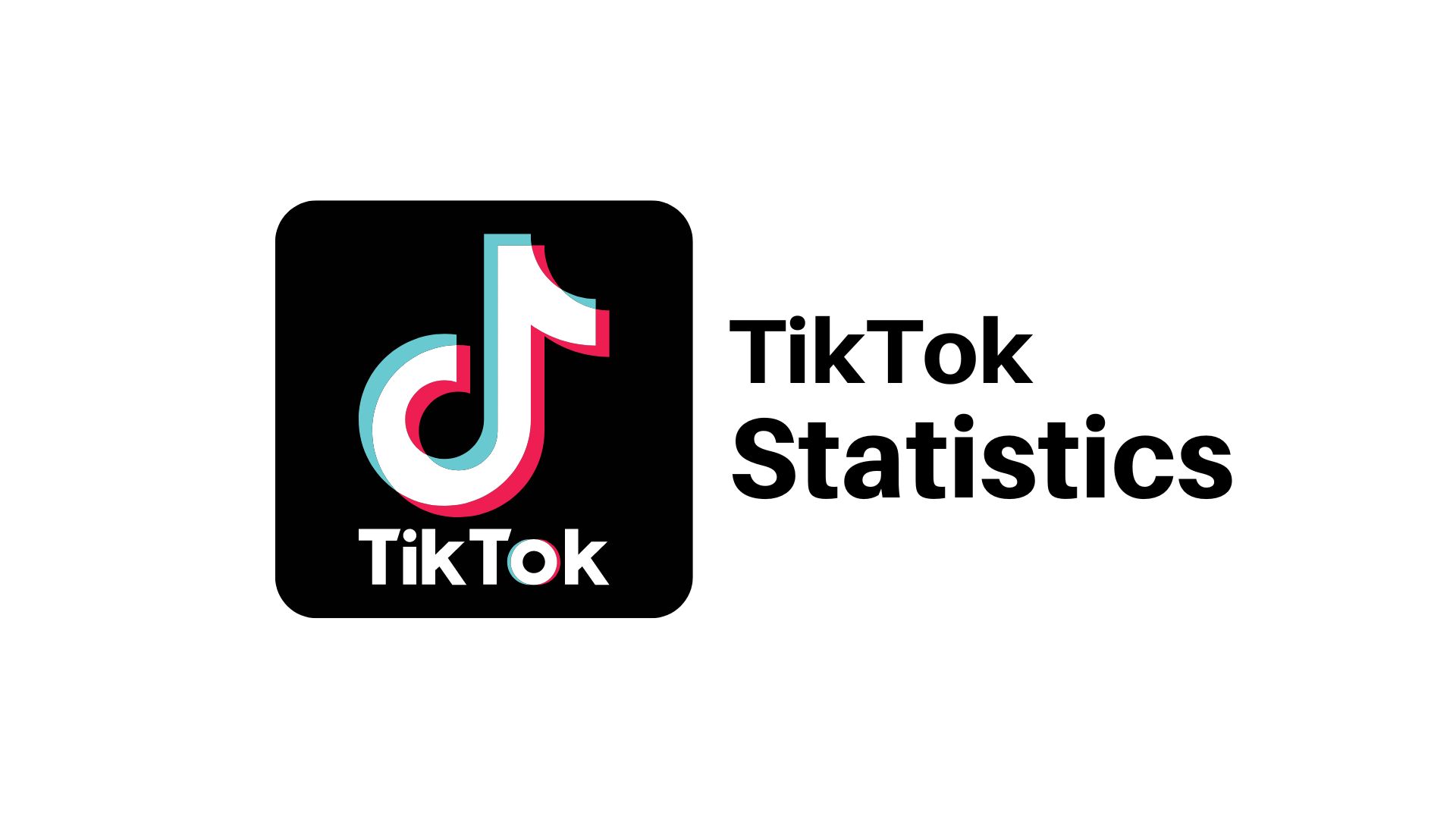Corporate Heritage Data Management Market: Growing Demand From USD 595.45 Mn To Boost Growth

Page Contents
Market Overview
Published Via 11Press: Corporate heritage data management Market is the process of collecting, organizing, preserving, and exploiting historical records and artifacts of an organization. This includes documents, photographs, videos, audio recordings, artifacts, and other materials which document a company's culture, values and history.
The Corporate Heritage Data Management Market size is expected to reach USD 4068.87 Mn by 2033, up from its current value of USD 595.45 Mn in 2022, growing at an annual compound growth rate (CAGR) of 19.09% from 2023-2033.
Key Elements of Corporate Heritage Data Management
- Collection: The initial step in any historical preservation project is to identify and collect relevant historical records and artifacts. This may involve searching through archives, reaching out to former employees, or searching online for materials.
- Organization: Once the materials have been collected, they need to be organized and cataloged in an accessible and searchable way. This may involve creating a digital archive or using specialized software to manage the data.
- Preservation: It is essential to safeguard historical materials in a way that guarantees their longevity and protects them from damage or loss. This may involve digitizing physical items, storing them securely, and implementing backup and recovery procedures.
- Access: Making historical materials accessible to employees, stakeholders and the public is an integral component of corporate heritage data management. This may involve creating an online portal or digital repository where people can search for and access materials.
- Utilization: Finally, it is essential to utilize historical materials in order to inform decision-making, inspire innovation and reinforce the organization's values and culture. This could involve including them into training programs, marketing collateral or other corporate communications materials.
Corporate heritage data management is an essential step in safeguarding and building upon an organization's history and culture. By collecting, organizing, conserving, and using historical materials, organizations can better comprehend their pasts, inform their presents, and shape their future directions.
Key Takeaways
- Corporate heritage statistics administration refers to the collection, organization, renovation and utilization of an organization's historical files and artifacts.
- These materials may include documents, photographs, videos, audio recordings, artifacts and other objects that depict the organization's history, way of life and values.
- Corporate heritage statistics management necessitates meticulous planning, close attention to detail, and the use of specialized software programs and tools.
- Corporate heritage facts administration is essential for maintaining an organization's history and culture, informing decision-making, stimulating innovation, and reinforcing values and culture.
- Corporate Heritage Statistics Administration should guarantee that historical materials are accessible to employees, stakeholders, and the public.

Request For Sample Report Here: https://marketresearch.biz/report/corporate-heritage-data-management-market/request-sample/
Regional Snapshot
- North America has long been a leader in corporate heritage records management, particularly within industries such as finance, science and manufacturing. Many firms have created dedicated archives with specialized personnel to preserve their historical materials.
- Corporate heritage information management is well-established in Europe, with many businesses having their own archives and museums. Some nations such as Germany have a longstanding culture of documenting and maintaining company history.
- Asia's corporate heritage statistics management practices vary considerably based on country and industry. Japan, for instance, boasts numerous large firms with extensive archives and museums. China too has seen an uptick in corporate heritage data management as organizations strive to preserve their records and culture.
- Corporate heritage statistics administration in the Middle East is a relatively recent practice. However, there has been an escalating passion for keeping and promoting cultural heritage, with some groups beginning to document and preserve their histories.
- In Africa, corporate heritage facts management is still in its early stages. However, some agencies are beginning to appreciate the significance of preserving their records and culture – particularly within industries like mining and finance.
- Corporate heritage information management practices have become increasingly essential as companies strive to preserve their history and culture, inform decision-making, and uphold their values and environment.
Inquire Here & Query for report: https://marketresearch.biz/report/corporate-heritage-data-management-market/#inquiry
Drivers
Organizations often adopt corporate heritage data management practices due to several motivations:
- Reputation and Branding: Preserving and exploiting an organization's historical records and artifacts can help build and reinforce its reputation and branding. By showcasing its culture, an organization can differentiate itself from competitors while inspiring trust and loyalty among stakeholders.
- Innovation and Creativity: Leveraging your organization's historical materials can inspire innovation and creativity. For instance, by studying past successes and failures, employees are able to identify new opportunities while avoiding repeating past errors.
- Regulatory Compliance: In certain industries, regulatory compliance necessitates organizations to maintain historical records and artifacts. Corporate heritage data management practices can help guarantee these requirements are met.
- Knowledge Management: Corporate heritage data management practices can assist organizations to capture and preserve institutional knowledge. By documenting an organization's history and culture, companies can guarantee that important insights are not lost when employees retire or depart the organization.
- Strategic Planning: Analyzing an organization's history and culture can inform strategic planning and decision-making. For instance, by recognizing patterns in past successes and failures, managers can devise strategies that are more likely to succeed in the future.
Restraints
- Corporate While organizations may have several incentives to adopt corporate heritage data management practices, there may also be obstacles that make it difficult for them to effectively maintain their historical records and artifacts. Corporate heritage data management can be a costly endeavor, necessitating dedicated personnel, specialized software and secure storage facilities. Small or resource-constrained organizations may find it difficult to allocate enough funds for an effective management of their historical materials. History records and artifacts may be stored in various places and formats, making it difficult to organize and manage them efficiently. This can result in data fragmentation which makes accessing and using historical materials a challenge.
- Historical records and artifacts often contain sensitive or confidential information, raising privacy and security issues. Organizations must take appropriate measures to ensure their data is securely protected. Effective corporate heritage data management necessitates specialized knowledge and experience; many organizations struggle to find staff with the necessary skillset or experience to effectively manage historical materials. Cultural barriers may make it difficult for organizations to manage historical records effectively; for instance, in certain cultures there may be a reluctance to share materials or digitize physical records.
Opportunities
- Utilizing historical records and artifacts can help an organization enhance its brand and reputation. Displaying a vibrant past and culture inspires pride and loyalty among employees, customers, and other stakeholders. By studying past successes and failures, an organization can uncover new possibilities for innovation and creativity. Historical documents and artifacts offer invaluable insight into the organization's strengths and weaknesses, offering guidance on future strategies and decisions. Corporate heritage data management practices can assist organizations in capturing and preserving institutional knowledge. This data can be utilized for informing current and future decision-making, preserving crucial insights that might otherwise be lost when employees retire or depart the organization.
- By sharing its history and culture with employees, an organization can cultivate a sense of purpose and belonging among staff members. Historical materials can be used to educate staff members about the organization's values and culture, reinforcing these concepts while creating a shared identity. Furthermore, making its historical materials accessible to the public helps engage local stakeholders while contributing to the preservation of cultural heritage; doing so helps build positive relationships with local stakeholders as well as enhances its reputation in the eyes of outsiders.
Challenges
- Data Fragmentation: Historical records and artifacts may be stored in various places and formats, making it difficult to organize them efficiently. This can lead to data fragmentation which makes accessing and using historical materials more challenging. Corporate heritage data management can be a laborious task, necessitating dedicated personnel, specialized software and secure storage facilities. Small or resource-constrained organizations may find it challenging to allocate enough funds for effective management of their historical materials. Furthermore, some historical records and artifacts may contain sensitive or confidential information which raises privacy and security issues. Organizations must take appropriate measures to guarantee that this data is adequately secured and safeguarded.
- Historical documents and artifacts can deteriorate with age, making digitization and preservation efforts costly and time-consuming. Organizations must ensure their historical materials are appropriately preserved and digitized in order to maximize their value. Effective corporate heritage data management necessitates specialized knowledge and experience. Unfortunately, organizations often struggle to locate or retain personnel with the necessary abilities and experience for managing historical materials effectively. Corporate heritage data management practices can offer organizations many advantages, but organizations must also be mindful of potential obstacles and challenges they may encounter. Successful corporate heritage data management requires meticulous planning, meticulous attention to detail, as well as the use of specialized tools and expertise.
Market Segmentation
Global Corporate Heritage Data Management Market by Solution
- Digital Asset Management
- Digital Collection Management
Global Corporate Heritage Data Management Market by Application
- BFSI
- Telecom and IT
- Retail
- Government
- Museums and Art
- Health Care
- Education
- Media and Entertainment
- Non-profit Organizations
- Hospitality
Key Players
- MediaBeacon, Inc.
- NetXposure, Inc.
- Widen Enterprises, Inc.
- Open Text Corporation
- North Plains Systems Corp.
Report Scope
| Report Attribute | Details |
| Market size value in 2022 | USD 595.45 Mn |
| Revenue forecast by 2033 | USD 4068.87 Mn |
| Growth Rate | CAGR Of 19.09% |
| Regions Covered | North America, Europe, Asia Pacific, Latin America, and Middle East & Africa, and Rest of the World |
| Historical Years | 2017-2022 |
| Base Year | 2022 |
| Estimated Year | 2023 |
| Short-Term Projection Year | 2028 |
| Long-Term Projected Year | 2033 |
Growing Demand => Request for Customization
Recent Developments
- Increased Focus on Digital Preservation: With the explosion of digital records and artifacts, there has been an increased emphasis on digital preservation within corporate heritage data management. Organizations are investing in specialized software and systems to guarantee their digital data is preserved properly for future generations to access.
- Utilization of Artificial Intelligence and Machine Learning: Organizations are increasingly turning to artificial intelligence and machine learning technologies for managing and analyzing their historical data. These solutions enable automation, the detection of patterns and trends, as well as extracting insights from large sets of information.
- Focus on Diversity, Equity and Inclusion: There has been an increasing emphasis placed on diversity, equity and inclusion within corporate heritage data management. Organizations strive to guarantee that their historical materials reflect a range of perspectives and experiences and are accessible to various stakeholders.
- Collaboration and Partnerships: Organizations are increasingly joining forces with external partners such as libraries, archives, and museums to pool resources and acquire expertise in corporate heritage data management. Doing so can help maximize the value of historical materials while ensuring their long-term preservation.
- Expansion of Corporate Heritage Programs: There has been an evolving trend towards expanding corporate heritage programs beyond traditional archival and historical materials. Organizations are incorporating more types of items, such as artifacts and buildings, into their programs to give a comprehensive overview of their history and culture.
Contact us
Contact Person: Mr. Lawrence John
Marketresearch.Biz (Powered By Prudour Pvt. Ltd.)
Tel: +1 (347) 796-4335
Send Email: [email protected]
The team behind market.us, marketresearch.biz, market.biz and more. Our purpose is to keep our customers ahead of the game with regard to the markets. They may fluctuate up or down, but we will help you to stay ahead of the curve in these market fluctuations. Our consistent growth and ability to deliver in-depth analyses and market insight has engaged genuine market players. They have faith in us to offer the data and information they require to make balanced and decisive marketing decisions.



